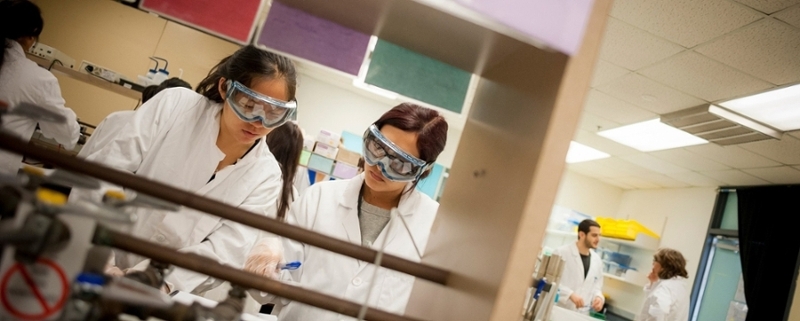Current Programs
- Bioengineering
- School of Medicine
-
Life Sciences
- Design Lab

In partnership with Boz Institute, we will offer a unique science research learning experience. Our programs will involve field work, fundamental molecular biology topics, modern laboratory techniques, and relevant bioinformatics and statistical applications. Learn to synthesize life science fundamentals, review literature, formulate hypotheses and design experiments, collect and process samples, execute experiments, analyze data, and showcase your work through poster presentations attended by local scientists and industry leaders.
Applications will open on December 16, 2019 for Summer 2020
This Research Program offers four research opportunities: Aging and Protein Aggregation, Endocrine Disruption of Embryogenesis, Ecological Biodiversity and Molecular Phylogenetics, and Fruit Fly Gender-Specfic Gene Activity During Stress.
Aging and Protein Aggregation: Premature aging is a major risk factor for physiological changes underlying diseases. Protein aggregation associated with aging disturbs the cellular environment and may contribute to an onset and progression of age-related diseases. In this study, we try to discover pathways through which protein aggregation could induce or facilitate the decline of cellular functions; we also explore methods to counteract the damaging effects of the aggregated proteins. Students will learn to maintain the roundworm Caenorhabditis elegans and use it as a model organism for this study. We will utilize bioinformatics tools, microscopy, fluorescent tagging and perform qPCR, western blotting, and ELSA to quantify gene-related activity and protein synthesis. Our data will be translated into corresponding biological relevance and help us better understand the biology of aging.
Endocrine Disruption of Embryogenesis: Endocrine disruptors are chemicals that mimic hormones and interfere with our endocrine system, potentially causing systemic adverse effects on human health. Even at low doses, endocrine disruptors can be detrimental to animal embryo and fetal development. Residential San Diego aquatic environments linked to the San Diego River are polluted with runoff and urban waste. Our study focuses on the estrogenic effects of environmental samples from Forester Creek, a historically polluted tributary to the San Diego River. Student will collect environmental samples, quantify estrogenic compounds, and study their physiological effects on zebrafish (Danio rerio) embryos. During their research immersion experience, students will engage in zebrafish husbandry and embryo culturing, perform chemical analysis, utilize microscopy to determine cellular and histological changes in zebrafish embryos, and identify statistically significant gene expression changes using qPCR analysis to better understand potential effects of estrogenic compounds in our environment.
Ecological Biodiversity and Molecular Phylogenetics: In collaboration with National Park Services at Carrillo National Monument, we have launched an effort to determine the genetic robustness of the Agave shawii shawii species. Shaw’s Agave suffered habitat loss along the Border Crossing due to construction of the border fence. Various other factors (topography, pests, soil chemistry, microbial diversity, and long reproductive cycles) may also have contributed to the population’s decline. We will collect plant tissue and soil samples from Cabrillo National Park to determine plant and microbial genetic variation. Using biomarker gene sequencing, our goal is to contrast variation within and between four populations of Agave. We will analyze soil, microbial enzyme activity, and genetic diversity of Agave and associated microbes to better understand complex ecological interactions within our ecosystem.
Fruit Fly Gender-Specific Gene Activity During Stress: Simplicity of gene expression data interpretation favors males; hence male lab animals are historically used more frequently in research projects. With this study, we challenge the validity and application of such practices by demonstrating that female and male animals differ in significant ways, even if reproduction is not directly involved. Our study aims to quantify metabolic brain gene expression between female and male fruit flies (Drosophila melanogaster) under several stressful conditions and highlight gender-specific coping mechanisms potentially relevant to human health. Students will learn to culture and manage fruit flies, distinguish fly genders and life stages using microscopy, dissect flies, and extract RNA for gene expression analysis. We will perform qPCR to quantify expression of genes involved in metabolic pathways to better understand the gender-specific coping mechanisms during stress.
In the final phase of this experience, students will synthesize their acquired knowledge and practical applications into a logical, coherent, formal communication: a manuscript, formatted according to peer-reviewed scientific literature guidelines. Along with an earned certificate and a written manuscript, students will hone their soft skills and participate in job / internship interview preparation.
Our full program concludes with a formal reception and poster presentation attended by accomplished local scientists and partners. Graduates will have the opportunity to showcase their work and establish relationships for future collaboration, internships, and relevant career opportunities.
Program Dates: July 6th - August 14th, 2020 (6 Week program - 6 hours a week committment)
Student Seminar Symposium – TBD
Session Options (please pick one):
Location: San Diego Science Center, 3030 Bunker Hill St, San Diego, CA 92109
Tuition: $2,000
Grade Level: Students must currently be in 10th - 12th grade
Cancellation or withdrawal for any reason prior to May 1,
Cancellation or withdrawal for any reason prior to May 20,
Cancellation or withdrawal for any reason May 21- June 1,
Refunds for cancellation or withdrawal after June 1,
All refund requests must be made in writing to Maysoon Dong, Sr. Program Manager, UCSD Pre-College Programs